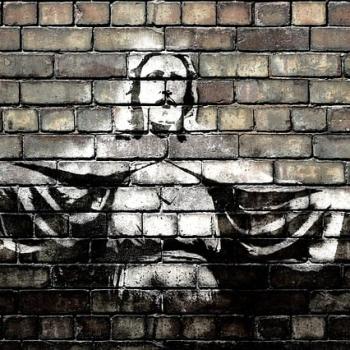My bishop, Andy Doyle, has made it a priority to say that people in the Episcopal Diocese of Texas should do theology. Just as with news sources, too many people get their bible interpretation and their theology from a single source, one with which they're already in agreement, when, as Bishop Doyle points out, it is the responsibility of every Christian to wrestle her or his way to a useable truth. As I wrote about Joel Osteen recently, bad theology makes for bad religion, so settling only for the theology you hear from the pulpit or your radio speaker may mean you are not living out your life of faith as you might—and perhaps should.
To think theologically is to enter into an ongoing conversation about who God is, what God wants, and how we are supposed to live. Since the Bible is not a rulebook that can be easily understood, theological reflection is what helps us determine our answers to these and other ultimate questions. I mentioned the Church Fathers above; any serious entry into this conversation should include reading those who helped to shape our beliefs today. Augustine's City of God speaks to our current situation and wrestles with the question of whether we should be more concerned with earthly or spiritual matters. Many American Christians have never read Augustine and don't even know the names of the Church Fathers, yet their work shaped Christianity and could shape us as well.
I've found many insights this past year reading John Calvin, a Reformation theologian and Bible scholar with whom I expected to disagree continuously. Like other Reformation theologians, he was seeking a new way to follow Jesus faithfully, and in his concern for the interplay between human redemption and human behavior, he previewed many problems of our modern world. I return again and again to The Institutes of Christian Religion, and think you might find this work rich and challenging as well.
For my 9/11 book, I've also been reading more recent Catholic, Orthodox, and Protestant theologians (and secular philosophers) on war, violence, and society. H. Richard Niebuhr's Radical Monotheism and Western Culture makes a nice counterpoint to the Christian realism of his brother Reinhold Niebuhr's The Irony of American History. John Yoder's life-work of Christian pacifism, especially Nonviolence: A Brief History joins the books of Stanley Hauerwas in arguing for a peaceful response to conflicts. Rowan Williams' Writing in the Dust: After September 11 is a small but beautifully-written and argued reflection on Christian responses to violence. And Jean Bethke Elshtain's Just War against Terror is the work of a Christian philosopher who, like Reinhold Niebuhr, suggests that the use of power to protect the helpless and to roll back evil is a faithful response.
Like the works we considered last week, the theological and philosophical texts I've mentioned here are in tension with each other, and perhaps with some or all of your beliefs. They come from different religious traditions, different time periods, and different political contexts. But reading and considering these and other works-even when I don't change my mind-has made me, I think, a more faithful interpreter of the Christian tradition, and a more thoughtful expounder of what I do believe.
Like all of you, I am still walking through the forest of our post-9/11 life. And experience suggests that reading widely and walking with an open mind is the only way to avoid seeing the same old bears everywhere.





